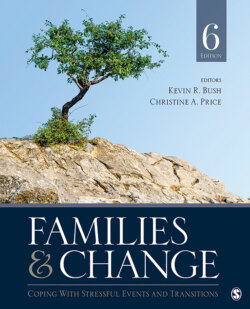Читать книгу Families & Change - Группа авторов - Страница 73
На сайте Литреса книга снята с продажи.
Chronic Stressors From the Social Environment
ОглавлениеSome of these persistent stressors result from the social context of families such as socioeconomic circumstances that compete with parenting roles. Chronic stressors such as work roles, poverty, immigration to a new culture, and marital conflict may have stressful effects, both for parents and their young. Included among such stressors are parents’ daily employment demands that compete with parenting due to long work hours, shift work, and unusually dangerous or stressful jobs (e.g., police work or combat military personnel) that contribute to parental stress and spillover into parent–child relationships (Collins, 2019; Escalante, 2019; Haines, Marchand, & Harvey, 2006; Bianchi & Milkie, 2010). Another source of chronic parental stress within ethnic-minority, immigrant families, generational dissonance, results from differential rates of immigrant acculturation as the younger generation accepts the new culture more rapidly than parents (Berry, Phinney, David, Sam, & Vedder, 2005; Birman & Poff, 2011; Gonzales, Fabrett, & Knight, 2009). Difficulties often arise when new cultural changes practiced by the younger generation cause parents to view their youth as betraying their culture of origin. The resulting increases in acculturative stress and parent–adolescent conflict may lead to greater distance between the generations (Berry et al., 2005, Birman, & Poff, 2011). Moreover, both persistent family poverty and prolonged marital conflict also can function as chronic stressors that can increase parental stress, spill over into the parent–child relationship and have detrimental consequences for the psychosocial outcomes of children and youth (Buehler, Benson, & Gerard, 2006; Finegood et al., 2017; Gerard et al., 2008; Lin et al., 2017; Santiago et al., 2012; Scarmella et al., 2008).
